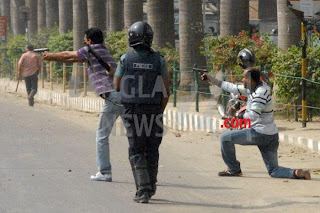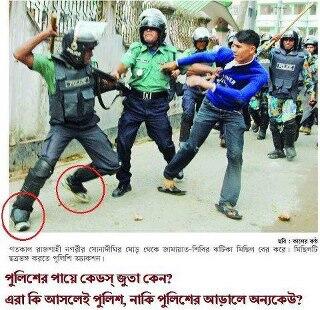The photos that clearly depicts the fascist role of Bangladesh Ruling Party Awami League and their police force that shamelessly patronizes the ruling party thugs (Bangladesh Chatra League, BCL) to use their weapons to kill them.
there is no human Rights in Bangladesh now, ways for criticism is far away! Almost all the media and newspapers are in full control by the ruling party and its alliance so that such reports are not reaching to the people of the world.
We are seriously concerned for the existence of democracy in Bangladesh. Fascism has gripped in every aspects here. We expect the kind consideration of the world to help this country for making it a place for living.
Ruling Party Men (BCL) are firing in support of Police to the opposition peaceful procession. #Dhaka [12 Feb 2013]
Police watches while allegedly ruling party men dragging opposition supporter (Shibir) while he is bleeding to death. #Dhaka [12 Feb 2013]
Police watches while allegedly ruling party men dragging opposition supporter (Shibir) while he is bleeding to death.#Dhaka [12 Feb 2013]
Police watches while allegedly ruling party men dragging opposition supporter (Shibir) while he is bleeding to death.#Dhaka [12 Feb 2013]
Two of the opposition supporters killed by Ruling Party men in presence of Police #Dhaka
Police killed opposition supporter in Chittagong. #Chittagong [05 Feb 2013]
Police killed opposition supporter in Chittagong. #Chittagong[05 Feb 2013]
Police killed opposition supporter in Chittagong #Chittagong [05 Feb 2013]
Police killed opposition supporter boy in Chittagong. The boy is 17 years old. Later Police disrupted his eyes #Chittagong [05 Feb 2013]
there is no human Rights in Bangladesh now, ways for criticism is far away! Almost all the media and newspapers are in full control by the ruling party and its alliance so that such reports are not reaching to the people of the world.
We are seriously concerned for the existence of democracy in Bangladesh. Fascism has gripped in every aspects here. We expect the kind consideration of the world to help this country for making it a place for living.
Ruling Party Men (BCL) are firing in support of Police to the opposition peaceful procession. #Dhaka [12 Feb 2013]
Police watches while allegedly ruling party men dragging opposition supporter (Shibir) while he is bleeding to death.#Dhaka [12 Feb 2013]
Police watches while allegedly ruling party men dragging opposition supporter (Shibir) while he is bleeding to death.#Dhaka [12 Feb 2013]
Two of the opposition supporters killed by Ruling Party men in presence of Police #Dhaka
Police killed opposition supporter in Chittagong. #Chittagong [05 Feb 2013]
Police killed opposition supporter in Chittagong. #Chittagong[05 Feb 2013]
Police killed opposition supporter in Chittagong #Chittagong [05 Feb 2013]
Police killed opposition supporter boy in Chittagong. The boy is 17 years old. Later Police disrupted his eyes #Chittagong [05 Feb 2013]


























